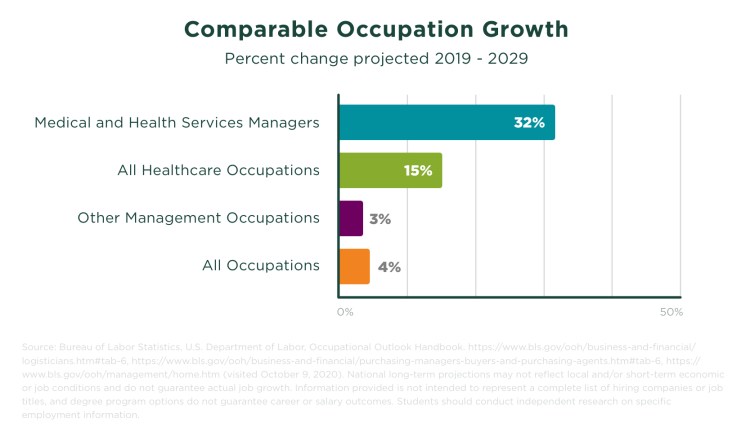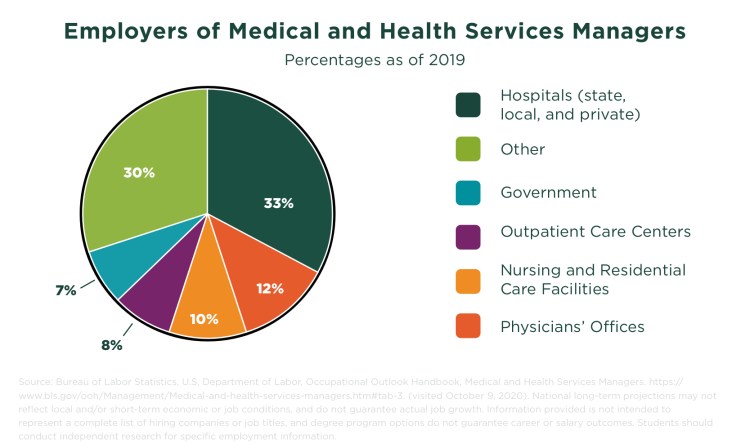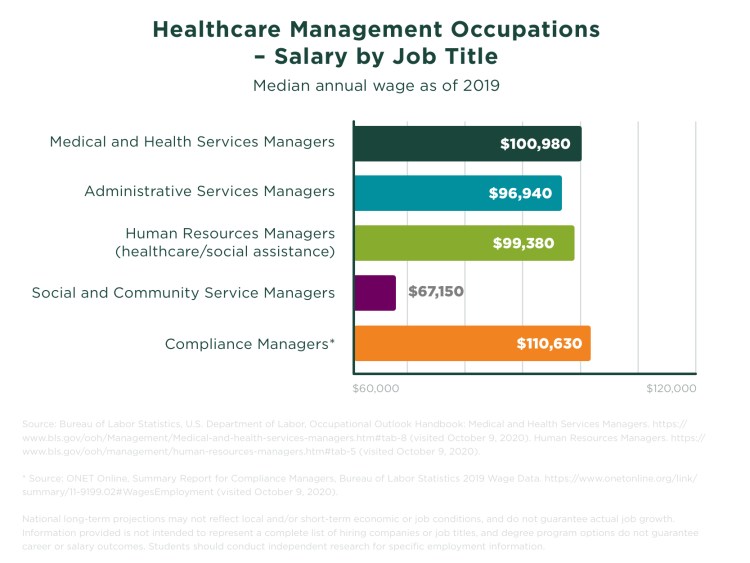4 Reasons to Choose a Career in Healthcare Management
Last Updated December 14, 2020

Healthcare is one of the fastest growing sectors in the nation. Employment opportunities in all healthcare occupations are slated to grow 15% from 2019 to 2029 with 2.4 million new jobs, according to the U.S. Bureau of Labor Statistics (BLS).* This means a greater need for knowledgeable managers and administrators who can lead to growing healthcare facilities and specialized departments.
The COVID-19 pandemic has put added pressure on the healthcare system and underscored the need for decisive and capable leaders within its ranks. Additionally, healthcare management offers career opportunities beyond the traditional patient care fields of physician, nurse or therapist. For the healthcare professional looking for career growth opportunities, variety in their work, competitive salary and the opportunity to advance and lead, here are four reasons to consider a career in healthcare management.
1. Job Openings and Growth in Healthcare Management
As the number of healthcare occupations continues to grow, the need for positions in healthcare management is growing faster than the healthcare sector as a whole and faster than other similar management positions. Employment of medical and health services managers is projected to grow a whopping 32% from 2019 to 2029, with an estimated 555,000 positions by 2029, according to the BLS.*
As the dynamic healthcare landscape continues to evolve through changes in government regulation and oversight, mergers and acquisitions of providers and healthcare systems, and the innovations of healthcare tech, the need for strong healthcare leadership with business knowledge and strategic managerial skills will continue to rise.

2. Variety of Jobs and Work Settings in Healthcare Management
Healthcare management offers a variety of positions, areas of specialization and healthcare settings in which professionals can pursue a career.
Medical and health services manager, administrative services manager, healthcare compliance manager/officer, managed care executive, healthcare administrator, and patient services manager are just some of the titles that fall under healthcare management. Depending on an organization’s size and needs, and an individual’s experience and education, healthcare management professionals may specialize in one area of a healthcare organization, such as a human resources manager, compliance officer, chief information officer or chief financial officer.
In fact, the majority of healthcare management professionals find themselves working in larger healthcare facilities, such as hospitals.

Healthcare facilities and governmental agencies aren’t the only places that seek healthcare management expertise. Medical supply and pharmaceutical companies, health insurance companies and research facilities need experienced healthcare professionals with a business mindset and strategic management skills.
3. Opportunity for Career Advancement in Healthcare Management
Experience in healthcare, whether administrative or clinical, is expected for those looking to move into a healthcare management position, particularly within a healthcare facility. For the knowledgeable healthcare professional looking to transition from patient care to healthcare management, the various areas of departmental specialization can offer an excellent starting point with opportunities for growth.
According to the American College of Healthcare Executives, an entry- to a mid-level management position in the following specialized areas or departments can be a path to upper healthcare management:
- Patient care services
- Nursing administration
- Government relations
- Planning and development
- Human resources
- Information systems
- Finance
- Marketing and public affairs
While many of these specialized healthcare management positions were once only found in large hospital systems (i.e., a hospital is more likely to have an HR department than a physician’s office), opportunities within physicians’ and health practitioners’ offices are expected to grow as more private practice physicians consolidate as group medical practices.
4. Competitive Healthcare Management Salary
According to the BLS, the median annual wage for medical and health services managers stands at $100,980 as of May 2019, which is higher than the median annual wages for other similar management-level occupations.*
In fact, many of the positions within the specialized areas or departments of healthcare management—from administrative services managers to human resources managers—offer higher-than-average salaries.

Making the Move into Healthcare Management
The field of healthcare management can offer career growth potential for clinical healthcare professionals that have a combination of on-the-job experience, knowledge of the unique business requirements and specialized areas of healthcare, and educational qualifications.
A master’s degree in healthcare management can offer a valuable credential and enhance the skillsets that can lead to advancement within the field. With healthcare-specific courses in economics, law, information systems, marketing, policy, supply chain, and strategic management, a master’s in healthcare management program can provide experienced professionals with the critical thinking, business acumen, and leadership skills to manage healthcare within a solid business framework.
*National long-term projections may not reflect local and/or short-term economic or job conditions and do not guarantee actual job growth. Information provided is not intended to represent a complete list of hiring companies or job titles, and degree program options do not guarantee career or salary outcomes. Students should conduct independent research on specific employment information.

